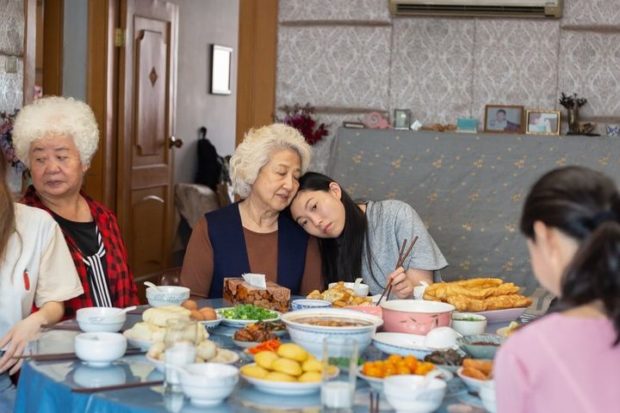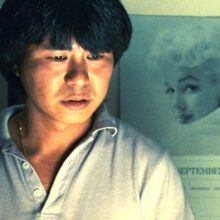

A Chinese-American family goes to China to visit the grandmother who is dying, but no one has told her the truth of her condition, in this tender comedy of grief and family.
The premise of The Farewell, the second feature from writer/director Lulu Wang, is fairly simple. Billi, a young Chinese American woman, is told by her parents that her grandmother in China, whom she calls Nai Nai, has been diagnosed with a fatal cancer and has only a few months to live. The catch is that no one has told Nai Nai this fact. It is the social custom in Chinese families to keep this knowledge from a family member, in order not to distress her, but in effect take the suffering on their own shoulders instead. And now the American branch of the family will visit China on the pretense of celebrating a hastily arranged marriage of one of Billi’s cousins, but with the real motive of having one last time to see their beloved grandmother.
If you saw the previews you might get the impression that this premise is an occasion for wry comedy, and that’s true as far as it goes, but on seeing the film you’ll discover that there’s a lot more to it. The Farewell is a tender and evocative portrait of family and its response to the demands of love and grief.
Billi is played by Awkwafina, a rapper and comedian who has recently made a splash as an actress in Ocean’s 8 and Crazy Rich Asians. In this film she proves that she can turn the volume down and play a dramatic role with range and genuine feeling. She is quite believable playing a young woman trying to balance the American and Chinese aspects of her identity, and experiencing some discomfort that this cultural juggling act brings up in her relationships with her parents and other family members. When she’s funny it springs from the logic of her character and not from contrived situations.
The supporting cast is marvelous, with Tzi Mai and Diana Lin shining as Billi’s father and mother, who tend to be hard on her for her lack of understanding of traditional Chinese ways, while at the same time showing their own insecurities around similar issues of identity and belonging. But there is one performer, in addition to Awkwafina, that really makes this picture work, helping to create a moving domestic drama, and that’s Shuzhen Zhao as Nai Nai. She perfectly conveys how lovable this grandmother is, with a warm and confiding interest in the welfare of her children and grandchildren, and where even her shortcomings, such as her need to control all the details of the wedding, seem just adorable. But gradually, through small details in the performance, and in the clues provided by the director, we understand some of the sadness underneath. Here is a woman whose family all moved to the United States, leaving her alone with a man (the step-grandfather) who just putters around the house without saying much, and she’s navigating a rather difficult existence in a modern Chinese city. But Wang lets us learn all this gently and subtly, without undue emphasis or overdramatizing.
Before the credits, we’re told that the story is “based on an actual lie.” However close to reality the story may be, the premise is a cultural fact. The family, including her father’s brother and others whom we get to know pretty well, doesn’t find it that easy to conceal the real reason for their visit. Throughout the events, most of which take place over just a few days, this tension between truth, and what one of the doctors calls “a good lie,” resonates within the context of a loving, imperfect, secretly grieving family. Billi thinks it’s wrong to maintain this pretense, but she acquiesces in what the family thinks is right—and to Wang’s credit, we are never pushed to favor one side or the other on this issue. Rather, the story is illuminated from all sides, with humor and compassion. The Farewell has some surprises in store—but none of the easy kind you might expect. Grief finds a close ally in joy.






